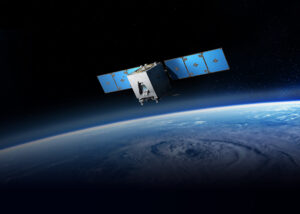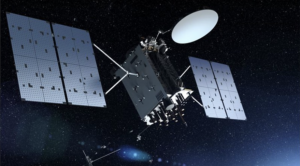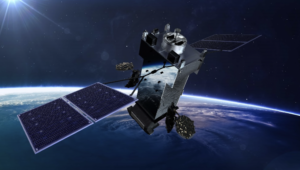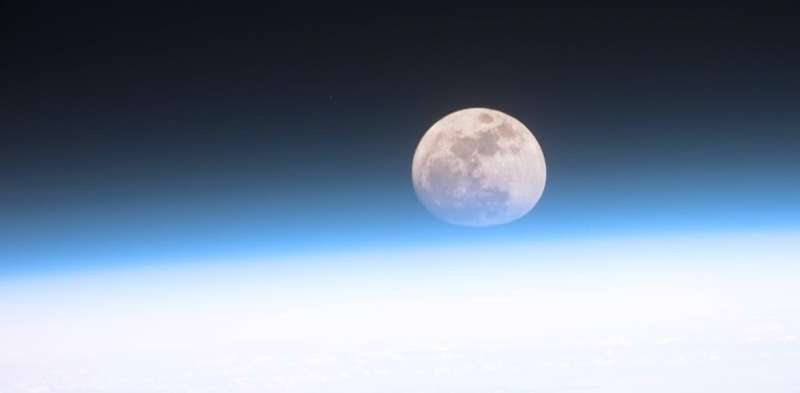NASA's NuSTAR Makes Illuminating Discoveries With 'Nuisance' Light
Wednesday, 02 March 2022 03:53 For almost 10 years, NASA's NuSTAR (Nuclear Spectroscopic Telescope Array) X-ray space observatory has been studying some of the highest-energy objects in the universe, such as colliding dead stars and enormous black holes feasting on hot gas. During that time, scientists have had to deal with stray light leaking in through the sides of the observatory, which can interfere with observations much
For almost 10 years, NASA's NuSTAR (Nuclear Spectroscopic Telescope Array) X-ray space observatory has been studying some of the highest-energy objects in the universe, such as colliding dead stars and enormous black holes feasting on hot gas. During that time, scientists have had to deal with stray light leaking in through the sides of the observatory, which can interfere with observations much Space exploration made lighter, more flexible with new product from Nicomatic
Wednesday, 02 March 2022 03:53 Nicomatic, the Pennsylvania-based provider of creative interconnect solutions, announces the release of a new product line for use in spacecraft: Flat Flexible Cables for Space. The flat flexible cable technology allows for lighter, more flexible space exploration of both satellites and spacecraft in low earth orbit, geosynchronous orbit, and beyond. Nicomatic's new product line has contributed
Nicomatic, the Pennsylvania-based provider of creative interconnect solutions, announces the release of a new product line for use in spacecraft: Flat Flexible Cables for Space. The flat flexible cable technology allows for lighter, more flexible space exploration of both satellites and spacecraft in low earth orbit, geosynchronous orbit, and beyond. Nicomatic's new product line has contributed HKATG is getting ready for its Golden Bauhinia Constellation
Wednesday, 02 March 2022 03:53 HKATG has successfully launched five satellites for its "Golden Bauhinia Constellation" in 2021, the aerospace development plan shows no sign of slowing down in 2022.
In January 2022, HKST announced that the Group has planned to launch two satellites named "Golden Bauhinia Satellite No. 3" and "Golden Bauhinia Satellite No. 4" in 2022 Q3, with the target launch time tentatively being sched
HKATG has successfully launched five satellites for its "Golden Bauhinia Constellation" in 2021, the aerospace development plan shows no sign of slowing down in 2022.
In January 2022, HKST announced that the Group has planned to launch two satellites named "Golden Bauhinia Satellite No. 3" and "Golden Bauhinia Satellite No. 4" in 2022 Q3, with the target launch time tentatively being sched Australian startups join forces to test AI computing in space
Wednesday, 02 March 2022 03:53 Two emerging Australian space startups - AICRAFT and Antaris Space Space - have signed of a memorandum of understanding (MOU) to test new Artificial Intelligence and Machine Learning (AI/ML) models in space, with the goal of developing and space-qualifying new computational capabilities for satellite-based applications.
Under the MoU the two startups, who are both members of the SmartSAT C
Two emerging Australian space startups - AICRAFT and Antaris Space Space - have signed of a memorandum of understanding (MOU) to test new Artificial Intelligence and Machine Learning (AI/ML) models in space, with the goal of developing and space-qualifying new computational capabilities for satellite-based applications.
Under the MoU the two startups, who are both members of the SmartSAT C Xplore secures $16.2M in venture funding and customer contracts
Wednesday, 02 March 2022 03:53 Xplore Inc. announced it has received $16.2 million in funding to date. The company has aligned itself with exceptional strategic and veteran space sector investors, including: Alumni Ventures, Brightstone Venture Capital, KittyHawk Ventures, Private Shares Fund, Starbridge Venture Capital, Helios Capital, Lombard Street and Gaingels. Notable investors also include Tremendous View, Kingfisher Ca
Xplore Inc. announced it has received $16.2 million in funding to date. The company has aligned itself with exceptional strategic and veteran space sector investors, including: Alumni Ventures, Brightstone Venture Capital, KittyHawk Ventures, Private Shares Fund, Starbridge Venture Capital, Helios Capital, Lombard Street and Gaingels. Notable investors also include Tremendous View, Kingfisher Ca SpaceX Falcon 9 rocket to launch Inmarsat's newest satellite
Wednesday, 02 March 2022 03:53 A SpaceX Falcon 9 rocket will launch the second in the Inmarsat-6 series of satellites, I-6 F2, from Cape Canaveral, Florida in Q1 2023. Japan's Mitsubishi Heavy Industries launched the first of the series, I-6 F1, in December 2021 and its fully electric propulsion system is now raising it to a geostationary orbital slot, 36,000km (22,000 miles) over the Indian Ocean. I-6 F1 will enter service i
A SpaceX Falcon 9 rocket will launch the second in the Inmarsat-6 series of satellites, I-6 F2, from Cape Canaveral, Florida in Q1 2023. Japan's Mitsubishi Heavy Industries launched the first of the series, I-6 F1, in December 2021 and its fully electric propulsion system is now raising it to a geostationary orbital slot, 36,000km (22,000 miles) over the Indian Ocean. I-6 F1 will enter service i Atlas 5 launches GOES-T weather satellite
Wednesday, 02 March 2022 01:32
An Atlas 5 successfully launched the latest in a series of geostationary weather satellites March 1, exactly four years after the launch of the satellite it is replacing.
The post Atlas 5 launches GOES-T weather satellite appeared first on SpaceNews.
General Atomics and Orion Space win contracts for military weather satellites
Tuesday, 01 March 2022 23:43
The U.S. Space Force selected General Atomics Electromagnetic Systems and Orion Space Solutions to each develop and launch demonstration satellites for weather imaging and cloud characterization.
The post General Atomics and Orion Space win contracts for military weather satellites appeared first on SpaceNews.
Lockheed Martin plots U.K. satellite manufacturing base
Tuesday, 01 March 2022 18:28
TAMPA, Fla. — Lockheed Martin is looking to set up a satellite manufacturing base in the United Kingdom to expand its global space business, the U.S.-based aerospace and defense giant said March 1.
The facility could potentially focus on building entire satellites, their parts or ground networks for government and commercial customers, according to Nik Smith, Lockheed Martin’s U.K. and Europe regional director for space.
Smith said the plans are still in the “fact-finding and feasibility” stage but also involve creating a research and development center in the U.K., and using the country to access more export markets.
Russian-European Mars rover 'very unlikely' to launch this year
Tuesday, 01 March 2022 17:47 A Russian-European mission to land a rover on Mars is "very unlikely" to launch this year due to sanctions over Moscow's invasion of Ukraine, the European Space Agency said.
The launch of the Rosalind Franklin rover, whose mission is to drill into Martian soil to seek out signs of life, was originally planned for 2020 but postponed due to Covid-19 and technical delays.
In January the ESA
A Russian-European mission to land a rover on Mars is "very unlikely" to launch this year due to sanctions over Moscow's invasion of Ukraine, the European Space Agency said.
The launch of the Rosalind Franklin rover, whose mission is to drill into Martian soil to seek out signs of life, was originally planned for 2020 but postponed due to Covid-19 and technical delays.
In January the ESA NASA to launch sophisticated weather satellite
Tuesday, 01 March 2022 17:47 NASA plans to launch the latest in an advanced series of weather satellites, the GOES-T, from Florida on Tuesday to improve weather forecasting over the Pacific and western United States.
United Launch Alliance's Atlas V rocket is prepared for liftoff during a two-hour window starting at 4:38 p.m. EST from Complex-41 at Cape Canaveral Space Force Station.
Meteorologists around th
NASA plans to launch the latest in an advanced series of weather satellites, the GOES-T, from Florida on Tuesday to improve weather forecasting over the Pacific and western United States.
United Launch Alliance's Atlas V rocket is prepared for liftoff during a two-hour window starting at 4:38 p.m. EST from Complex-41 at Cape Canaveral Space Force Station.
Meteorologists around th Lockheed Martin selects Raytheon to supply a second payload for missile-warning satellites
Tuesday, 01 March 2022 17:32
Lockheed Martin announced March 1 it has selected Raytheon Technologies to supply a second payload for the Next Generation Overhead Persistent Infrared (Next Gen OPIR) geosynchronous satellites.
The post Lockheed Martin selects Raytheon to supply a second payload for missile-warning satellites appeared first on SpaceNews.
Lockheed Martin and Northrop Grumman select payload providers for Space Force missile-warning satellites
Tuesday, 01 March 2022 17:32
Lockheed Martin announced March 1 it has selected Raytheon Technologies to supply a second payload for the Next Generation Overhead Persistent Infrared (Next Gen OPIR) geosynchronous satellites.
The post Lockheed Martin and Northrop Grumman select payload providers for Space Force missile-warning satellites appeared first on SpaceNews.
A rocket is going to crash into the moon: Accidental experiment on the physics of impacts in space
Tuesday, 01 March 2022 15:30
On March 4, 2022, a lonely, spent rocket booster will smack into the surface of the moon at nearly 6,000 mph. Once the dust has settled, NASA's Lunar Reconnaissance Orbiter will move into position to get an up-close view of the smoldering crater and hopefully shed some light on the mysterious physics of planetary impacts.
As a planetary scientist who studies the moon, I view this unplanned impact as an exciting opportunity. The moon has been a steadfast witness to solar system history, its heavily cratered surface recording innumerable collisions over the last 4 billion years. However, scientists rarely get a glimpse of the projectiles—usually asteroids or comets—that form these craters. Without knowing the specifics of what created a crater, there is only so much scientists can learn by studying one.
Boeing increases use of 3D printing to speed up production of WGS military satellite
Tuesday, 01 March 2022 14:43
Boeing is 3D printing more than a thousand parts for WGS-11+, a new communications satellite it is producing for the U.S. Space Force
The post Boeing increases use of 3D printing to speed up production of WGS military satellite appeared first on SpaceNews.

